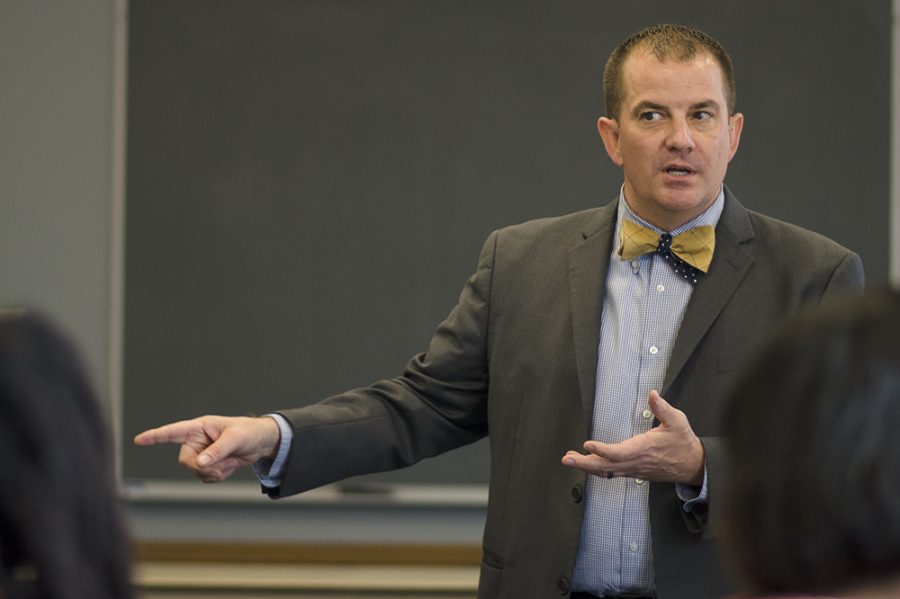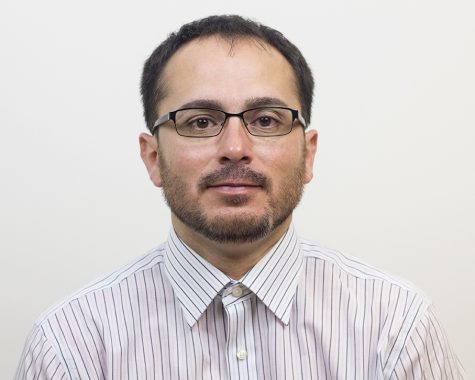Third provost candidate shares vision for Eastern
Jay Gatrell, provost candidate No. 3 met with students and faculty Thursday, March 30 in the Tuscola/Arcola Room of the Martin Luther King Jr. Union to provide information about his past and answer questions from those in attendence. Gatrell is currently the Vice Provost at Bellarmine University in Louisville, Ky.
March 31, 2017
The third provost candidate Jay Gatrell took a personal approach to address issues students and faculty mentioned in the student and faculty forums yesterday.
Gatrell currently serves as Vice Provost at Bellarmine University. Gatrell said part of the reason he is qualified for this position is his breadth of experience in higher education. He said starting higher education as a PELL-eligible first-generation college student gives him a unique perspective.
“I’ve basically done everything in terms of the academic works portfolio,” Gatrell said.
Senior history major Michael Spencer said he was curious what Gatrell would do to make a marketing plan that works with the mission statement, which prioritizes arts and humanities.
“In the hiring advertisement that Eastern put out for this job, the top section is dedicated primarily to the entrepreneurial duties of the provost,” Spencer said. “In past sessions, when people have spoken to the entrepreneurial duties of provost, those have tended to be geared toward the STEM (Science, Technology, Engineering and Mathematics).”
Gatrell said it is possible to be entrepreneurial in the arts and humanities. He said one way to accomplish this would be a digital humanities or digital arts program. He also suggested making students and faculty talents more visible in the community through hosting an art show off campus.
“Effective mission statements, as they are lived and experienced, they evolve, they change and are by definition entrepreneurial,” Gatrell said directly addressing Spencer.
Courtney Jones, a college student affairs graduate student, said she wanted to know how Gatrell would ensure minority students felt welcome on campus.
“About a year ago at Missouri State University, a lot of students experienced micro aggression,” Jones said. “In case a situation happens here, what can you [Gatrell] do for the minority students, the international students that may have a problem with their professor, that may feel as if they don’t feel comfortable in their classrooms because they’re targeted?”
Gatrell said a dialogue must occur about how diversity is lived and expressed on campus. He said it is difficult work for everyone engaged in this dialogue, and while these discussions on diversity are powerful, they can also be painful.
“It’s an opportunity for us to use student programming, to challenge individuals and faculty to do better, to be mindful,” Gatrell said. “Just because somebody is paying a tuition bill doesn’t mean they feel welcome.”
Gatrell said one way to make the transition into university easier might be to create a more centralized place for student services.
“You could create a one-stop where all the student services are in one location, so a student doesn’t have to walk across campus to pay their bill, to do this, to do that,” Gatrell said. “A one-stop shop, truly, where every question can be answered, where there’s cross-training and care built into it. That sort of co-location piece is actually a pretty low-cost solution to a complex problem every student experiences.”
History professor Ed Wherle asked how Gatrell would handle faculty disputes.
“If there is truly a conflict, sometimes it makes sense to bring in a third party, to have a dialogue and there are folks in Human Resources who can do that, and Human Relations is critical,” Gatrell said. “By and large when I’ve dealt with conflicts that have been incredibly thorny a lot of the times it is about lack of communication.”
Biological sciences professor Britto Nathan said he likes Gatrell not only because of his ideas for improving the university, but also because Gatrell has a background in geography.
“I’m really liking you [Gatrell] very much because I’m a biology professor. You talk about trees and dirt and I don’t have to come to work and you’ll be alright with that,” Nathan said jokingly.
Britto Nathan said he hopes Gatrell’s values match up with those of the Eastern community. Nathan said he loves the history, faculty and community of Eastern, but he realizes compared to Bellarmine University, Eastern has some difficult financial issues.
“How would you feel coming from an institution that is a private funded institution coming to an institution like Eastern where we are struggling a lot with financial problems?” Nathan asked.
Gatrell responded that although his current school does not have this issue, he had experience with this issue while working at Indiana State University during the recession. Gatrell said he feels he is prepared and higher education is about the growth of the students no matter what university a person works at.
“Ultimately, what we do in higher ed is we make qualitatively different people,” Gatrell said. “We transform eighteen-year-olds to become engaged citizens, whatever that means for them. And we do so within a safe environment where they can develop personally and professionally and psychosocially.”
Chrissy Miller can be reached at 581-2812 or [email protected].




















































